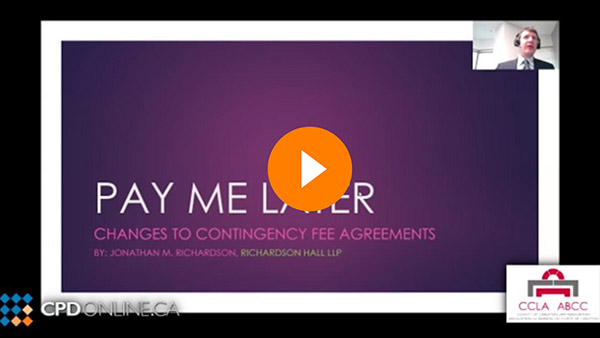Get an early start on your EDI CPD requirements with this week’s presentation hosted by the County of Carleton Law Association (CCLA) which includes 30 minutes of accredited EDI.
To begin, Johnathon Richardson gives an up-beat presentation on the changes to contingency fee arrangements. Richardson discusses the mandatory standard form CFA, along with the two exceptions for its use. He also explains the importance of transparency when calculating contingency fees, and the requirement to post the maximum contingency fee percentages on the lawyer’s/ firm’s website.
Next, Samantha Peters endeavours to address anti-black racism, and how to advocate without being part of the problem. She considers how advocates should be thinking when it comes to anti-black racism, as per the Law Society of Ontario’s rules of professional conduct. Samantha Peters claims that lawyers have a professional responsibility to know how the law intersects with anti-black racism, and have an ethical obligation not to perpetuate stereotypes and myths that fuel harmful perceptions.
The next presentation features Justice Sylvia Corthorn and Robin Brown, as they present updated best practices regarding the obligation to disclose partial settlements. The speakers address Tallman Truck Centre Limited v. K.S.P. Holdings Inc., Poirier v. Logan, Waxman v. Waxman, and the reasons for making prompt disclosures of partial settlements.
Finally, Sean Van Helden educates us on avoiding deplorable trial practices. During his presentation, he addresses 3 lessons learned from Girao v. Cunningham, 2020 ONCA 260 and Bruno v. Dacosta, 2020 ONCA 602. Van Helden discusses trial document briefs, and the questions that need to be asked when considering how the documents in the joint book of documents are to be treated for trial purposes. Next, he explains expert evidence, and the distinction between section 35 and 52 of the Evidence Act. Van Helden also explains the roles of the trial judge and counsel where one party is self-represented.
Share the Love!
Do you have a friend or colleague who could really benefit from this content? Please feel free to share this blog post! Make someone’s life easier today, it’ll feel good!
What is your take?
Did this video help you in any way? How do they impact on your practice? Feel free to contact me and share your opinion or knowledge.
What would you like to see more of?
At CPDonline we serve your learning needs. Is there a topic you would like to learn more about? Please contact me and if we have your topic in our library, I will send you a direct link. If not, we’ll add it to our training wishlist.

